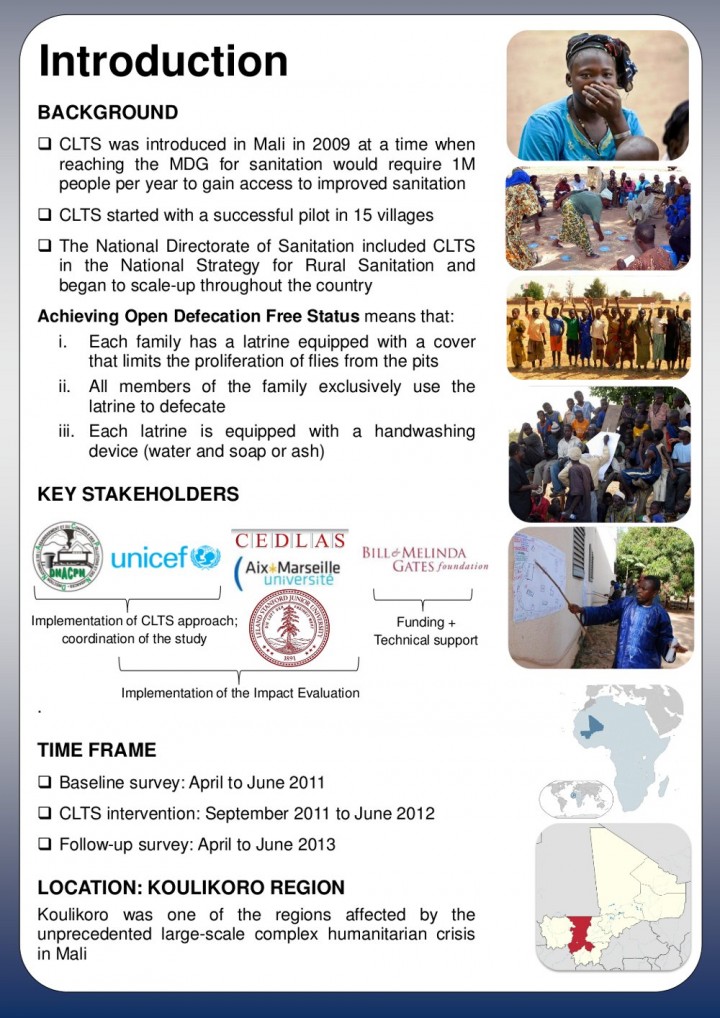Evaluating the Impact of Community Led Total Sanitation (CLTS) Programs in Mali Alzua, M. L. et al. (2015)
This library entry contains documents for a grant that Maria Laura Alzua is leading and which is funded by the Bill and Melinda Gates Foundation.
Goal:
to improve the evidence of the effectiveness of Community Led Total Sanitation Programs on health and behavioral outcomes
Purpose (copied from Trial description: https://clinicaltrials.gov/ct2/show/NCT01900912):
Behavioral change is a key ingredient for successful adoption of better sanitation practices in rural Africa. Sanitation programs have, for some time now, incorporated the need to raise awareness and emphasize the benefits of toilet usage. These endeavors, often combined with subsidies linked to toilet construction by households, seek to create a demand for sanitation goods. Yet, progress in securing the desired outcomes from sanitation programs has been slow. Moreover, benefits of sanitation largely take the form of externalities, which individuals do not take into account when making their own decisions about investments. This makes sanitation promotion at the household level particularly challenging.
A new approach to sanitation entails a shift away from the provision of subsidies for toilets to individual households and a promotion of behavioral change at individual-level towards emphasizing collective decision-making in order to produce 'open defecation-free' villages. The objective of the intervention is to reduce the incidence of diseases related to poor sanitation and manage public risks posed by the failure to safely confine the excreta of some community members. The way to achieve this objective is by empowering communities motivated to take collective action. Local governments and other agencies perform a facilitating role. There is a growing recognition that this approach, referred to as Community-Led Total Sanitation (CLTS), may help with the reduction of open defecation practices. However, no rigorous impact evaluation of CLTS has been conducted so far. This randomized controlled trial will study the effect of CLTS in rural Mali. As a result, sound evidence will become available to see to what extent CLTS improves health outcomes and what is driving collective action in order to increase sanitation coverage.
The direct recipients of the intervention are members of rural communities in Mali who aspire to live in a cleaner environment. The donor community, international organizations, and governments in developing countries will benefit from having simple and clear evidence on the effectiveness of an innovative program for improving sanitation in rural areas. They will learn whether the program has worked or failed to achieve its objective of eradicating open defecation, and about key factors explaining success and failure.
Documents available:
1 - Poster presentation at FSM3 Conference in Hanoi, Vietnam (January 2015): Key findings of the impact evaluation of rural sanitation Programme in Mali
1b - Powerpoint presentation at FSM3 Conference in Hanoi, Vietnam (January 2015): Key findings of the impact evaluation of rural sanitation Programme in Mali
2 - Final Report (June 2015): http://www.susana.org/en/resources/library/details/2301
3 - Pickering, A., Djebbari, H., Lopez, C., Coulibaly, M., Alzua, M. (2015): Effect of a community-led sanitation intervention on child diarrhoea and child growth in rural Mali: a cluster-randomised controlled trial. Lancet Global Health, Vol. 3, Nov 2015, e701–711.
Bibliographic information
Alzua, M. L. et al. (2015). Evaluating the Impact of Community Led Total Sanitation (CLTS) Programs in Mali Various documents on results from research grant. Universidad Nacional de La Plata, Argentina
Filter / Tags
RuralEnglish
External links
Link to final report (June 2015)
Link to clinical trial description
Downloads
1 - Poster presentation at FSM3 Conference in Hanoi, Vietnam (January 2015): Key findings of the impact evaluation of rural sanitation Programme in Mali
Type: application/pdf
Size: 1.39 MB
1b - Powerpoint presentation at FSM3 Conference in Hanoi, Vietnam (January 2015
Type: application/pdf
Size: 1.82 MB
3 - Pickering, A., Djebbari, H., Lopez, C., Coulibaly, M., Alzua, M. (2015): Effect of a community-led sanitation intervention on child diarrhoea and child growth in rural Mali: a cluster-randomised controlled trial
Type: application/pdf
Size: 0.5 MB

